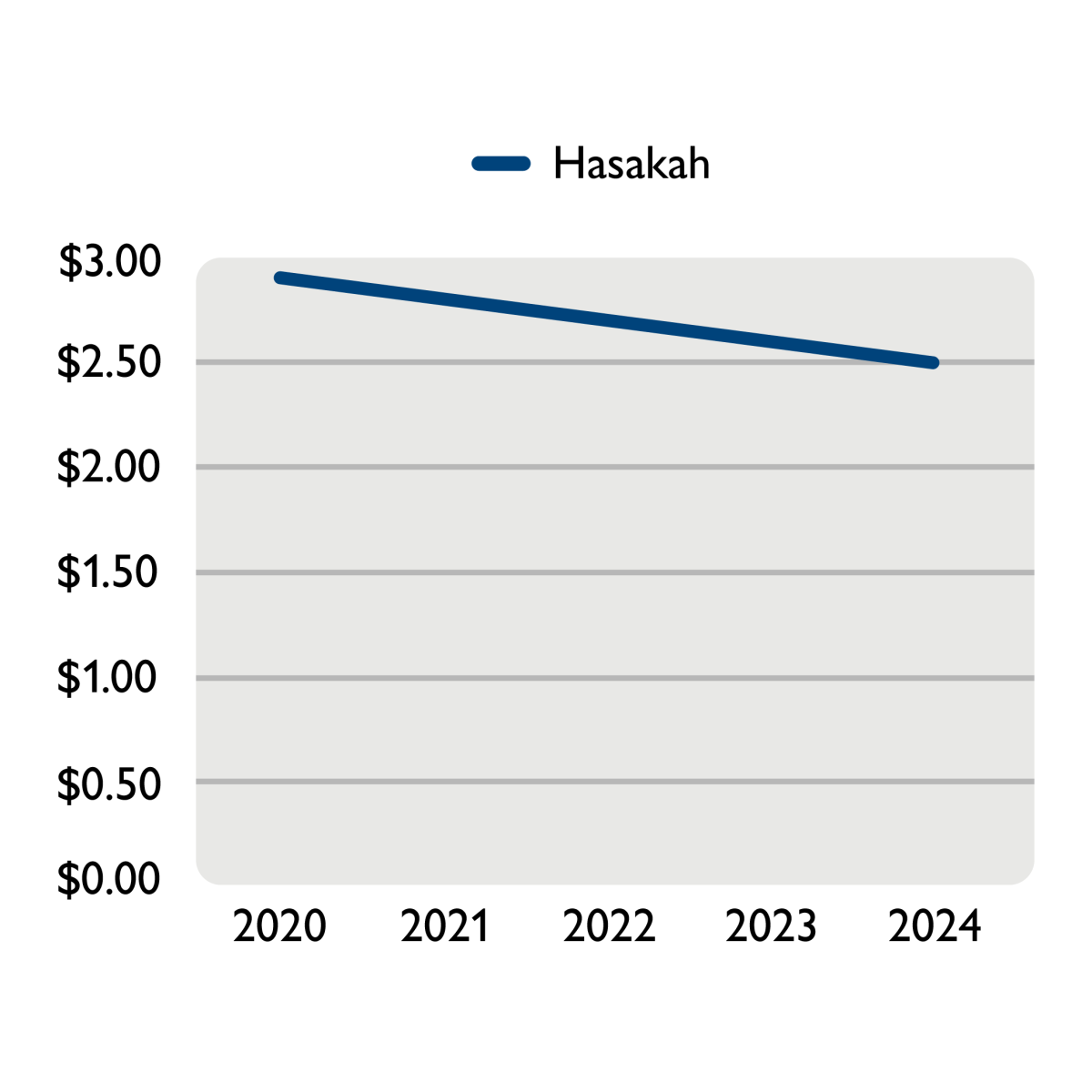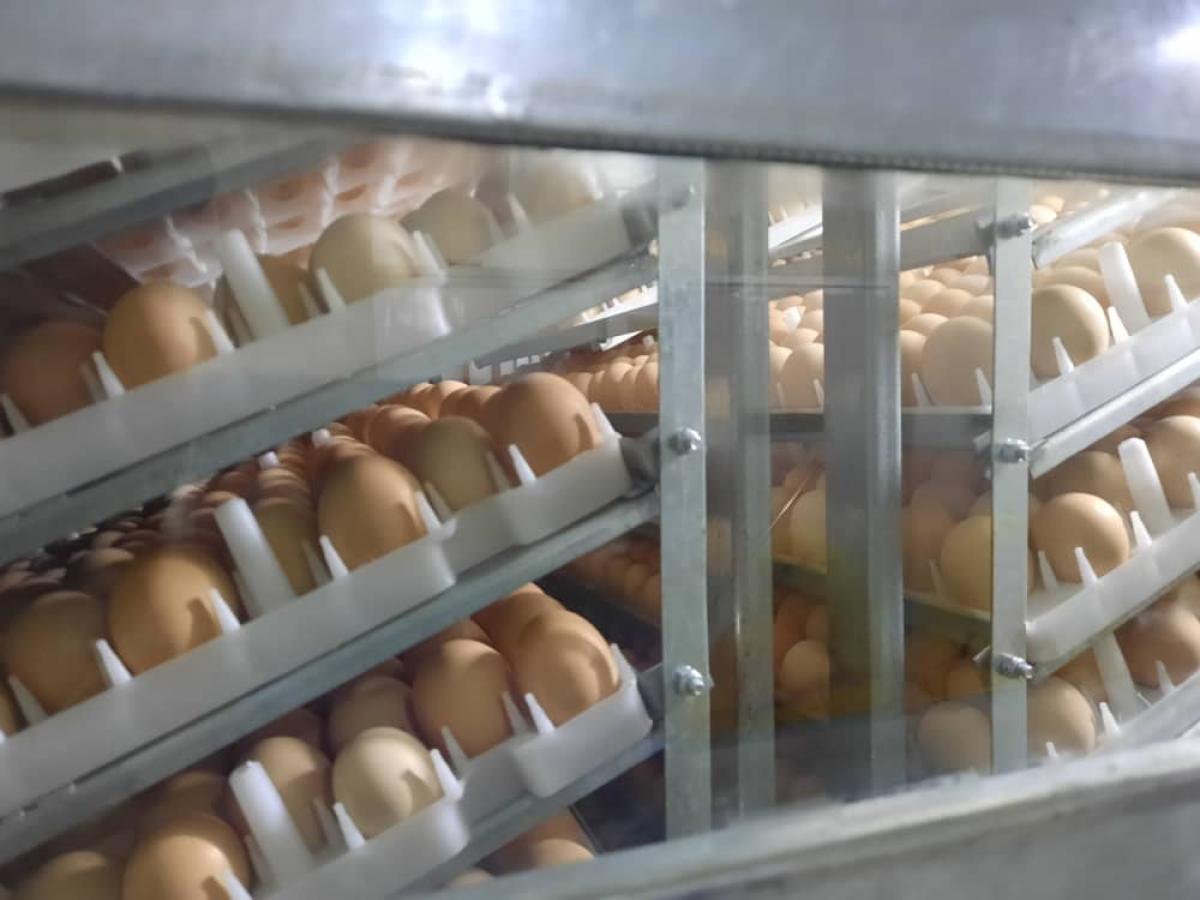Revitalizing the Poultry Value Chains in Northeast Syria
Throughout Northeast Syria, poultry is a critical economic value chain as it supplies food staples and agricultural livelihoods. However, local inputs, such as fertilized eggs and chicks, were unavailable due to years of conflict and degradation of the value chain, forcing farmers to import chicks at higher prices and resulting in high chicken meat market prices. In 2021 and 2022, to address this need, USAID, through the Essential Services, Good Governance, and Economic Recovery (ES) program rehabilitated and established new facilities to revitalize the poultry industry in northeast Syria. In total, USAID rehabilitated 27 private poultry farms and established a chick hatchery in Hasakah; and established two fertilized egg production farms and a chick hatchery in Deir ez-Zour. To further build upon these activities, in 2024, USAID established a fertilized egg production farm and table egg production farm in Hasakah.
USAID’s Objectives: 1) revitalize the local poultry value chains; 2) reduce reliance on expensive chick and egg imports; 3) increase self-reliance and economic stability; 4) strengthen food security in Northeast Syria (NES); and 5) reduce the cost of farming inputs and food prices.
Chicks
Price per single chick

Chicken
Price per kilogram

Eggs
Price per 30 egg carton

Overall, these activities reduced the cost of chicks for poultry farmers, the prices of chicken meat and eggs for consumers:
Cost of Chicks for Poultry Farmers
USAID’s activities reduced the cost of farming inputs for poultry farmers by nearly 50% in Hasakah and over 20% in Deir ez-Zour.
Hasakah: The initial cost of a chick was $0.75 in 2021, but after activity implementation, it decreased to $0.55 and to just $0.38 by the end of 2022 (49% reduction).
Deir ez-Zour: Before USAID interventions, the price of one chick was $0.45 USD (2020). In 2021, just one month after USAID’s intervention, the price decreased to $0.35 USD (22% reduction).
*Most recently in January 2024, the price of chicks increased to $0.50 in Hasakah and Deir ez-Zour, due to the current unstable security situation in NES (i.e. regional conflicts, Turkish airstrikes), and the extreme rise in the Syrian Pound (SYP) exchange rate against the USD. Since 2020, the SYP exchange rate has increased 488% in both Hasakah and Deir ez-Zour.* Despite this, the marginal increase in chick prices in both provinces is far less than the percentage change in the SYP exchange rate.

Chicks from the hatchery in Deir ez-Zour

Chickens at the table egg production farm in Hasakah
Prices of Chicken Meat for Consumers
Chicken meat prices in local markets decreased by 25% following USAID ES program’s activities, thus reducing the cost of poultry to consumers and improving food access in NES.
Hasakah: the initial price of chicken meat in local markets was $1.80 per kilogram (/kg) in October 2021. After USAID’s intervention, it decreased to $1.60/kg and further to $1.35 by November 2022 (25% decrease).
Deir ez-Zour: the price of chicken meat was also $1.80/kg, and after implementation, decreased to $1.50/kg and then to just $1.35/kg (25% decrease).
*Despite the price of chicken meat increasing to $2/kg in Hasakah and Deir ez-Zour in January 2024 due to security and the extreme rise in the SYP exchange rate, it is notable that the marginal increase of chicken meat prices is far less than the mentioned SYP exchange rate percentage. Most recently, the prices of chicken meat have dropped to between $1.55 to $2/kg in April 2024.
Prices of Table Eggs for Consumers
Alongside the price of chicken meat decreasing, the price of a carton of eggs (30 eggs per carton) in Hasakah have also decreased following the USAID ES program support to establish a table egg production farm in 2024.
Hasakah: The retail market price of an egg carton prior to the intervention was $2.90, which has since decreased to $2.50 in April 2024 (14% reduction).
The newly established table egg production farm in Hasakah has approximately 12,000 chickens, producing on average 9,000 eggs per day.

Fertilized eggs in the chick hatchery in Hasakah
Continuing to Strengthen NES Poultry Value Chains
Not only did the cost of chicks, chicken meat, and egg cartons decrease following these interventions, the activities also created 151 new full time and part-time jobs and benefitted 320 direct employees of the facilities and farmers. According to the Deir ez-Zour and Hasakah Agricultural Committees, the activities in both provinces reduced imports by 15% in the local poultry value chains, overall reducing poultry costs and reliance on imports. This has generated greater economic stability and food security within the region as input costs for farmers and chicken meat and egg costs for consumers have decreased.
Following the success of these poultry value chain activities in Deir ez-Zour and Hasakah, the USAID ES program expanded poultry interventions into Raqqa with the establishment of a fertilized egg production farm and chick hatchery, currently in implementation and scheduled to be complete this fall.

